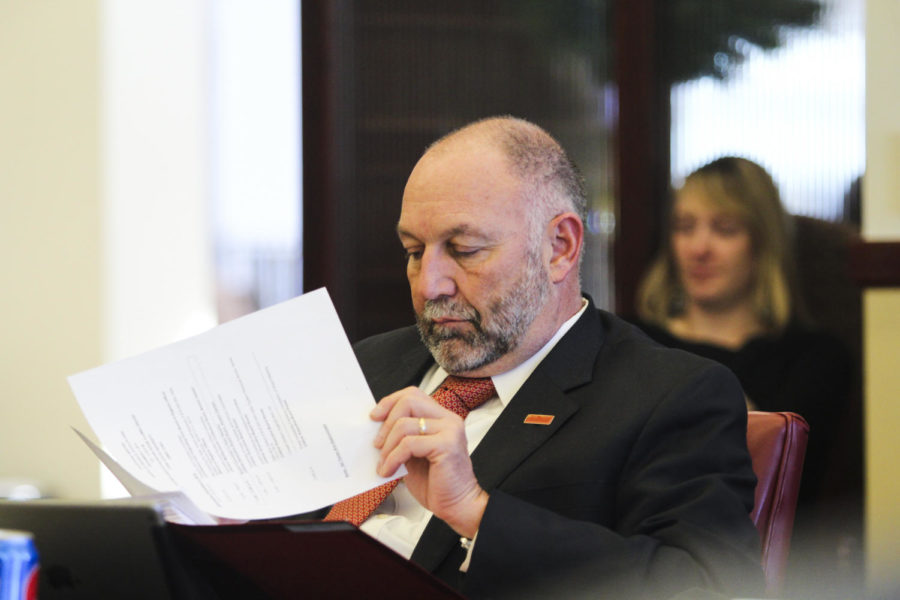Funding equality long overdue
Kelby Wingert/Iowa State Daily
ISU president Steven Leath listens during the Iowa Board of Regents meeting on Dec. 3, 2014 at the Alumni Center.
May 8, 2015
The Iowa Legislature is currently considering appropriations to the three Regent universities for the fiscal year that begins July 1. Included in the debate is the most significant change in the Regents’ approach to funding in nearly 70 years.
It’s called performance-based funding (PBF), and it’s important to students, parents, faculty and staff members, and all taxpayers of Iowa. The Board of Regents adopted the plan in June 2014 and made it the basis for the pending appropriations request.
Traditionally, the largest allocation of state funds has been to the University of Iowa (UI), with Iowa State University (ISU) second, and the University of Northern Iowa (UNI) third. In fact, this fiscal year, the percentages are 46 percent ($230 million) to UI, 36 percent ($180 million) to ISU, and 18 percent ($93 million) to UNI. And while those figures tell a story, the magnitude of the inequity is best illustrated in the amount of state support provided to each university on a per resident student basis; UI receives approximately $14,500 per student, as compared to approximately $9,000 per student for ISU and UNI.
This imbalance is due to the use of base-plus budgeting, which means if the legislature appropriates more money a uniform percentage is added to the funding for UI, ISU and UNI. Continued use of base-plus funding makes an inequitable situation worse.
PBF would provide a new method for allocating state dollars, which is transparent, flexible, and recognizes the ever-changing enrollment demands being driven by the modern economy.
UNI’s enrollment is nearly 90 percent resident students, so the university has been unable to benefit financially from a larger number of out-of-state students. ISU is growing. Enrollment is up more than 30 percent in the last seven years, largely due to demand for graduates in STEM fields. ISU educates the largest number of resident students – 20,260 – among the three universities. To maintain high quality and meet students’ needs, ISU is hiring additional faculty, expanding classroom and laboratory hours, adding research facilities and housing.
The performance-based funding plan calls for allocating funds to the Regent universities based on the following:
Resident enrollment 60 percent
Student progress and attainment 15 percent
Access for low-income and minority students 10 percent
Sponsored research 5 percent
Graduate and professional students 5 percent
Other selected metrics 5 percent
Performance-based funding would benefit ISU and UNI by recognizing, rather than penalizing, our enrollment of Iowans. For the first time, it would show the taxpayers of Iowa why various allocations are made to each Regent university. It’s a sensible plan that links funding to performance and Iowa tax dollars to Iowa students. Finally, it’s a long term solution to a decades old funding inequity and places all three universities on a path to success by aligning variable costs with variable revenues.
The Regents didn’t adopt PBF to reward or penalize any university. Because application of the plan would shift more money to ISU and UNI, the Board requested appropriations to keep UI whole in the first year. Over time the funds would clearly track the factors
Iowans consider important. In addition the Board will review performance-based funding annually and adjust the formula based on any unintended consequences or arising market conditions.
It’s helpful to recall the words of the five-member task force that spent nearly one year analyzing the funding issue and preparing recommendations to the Regents last year:
“Presently, the Board is perpetuating the priorities of yesterday rather than funding the priorities of today and tomorrow.”
We greatly appreciate the strong leadership provided by the Board of Regents in advocating for performance-based funding and the recent statement of support from Gov. Branstad. We’re committed to working with the Legislature and the Governor to ensure the adoption of performance-based funding. It deserves support.
Steve Leath, Iowa State University President
Bill Ruud, University of Northern Iowa President







